|
|
|
Sort Order |
|
|
|
Items / Page
|
|
|
|
|
|
|
| Srl | Item |
| 1 |
ID:
132902
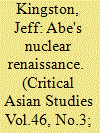

|
|
|
|
|
| Publication |
2014.
|
| Summary/Abstract |
Prime Minister Abe Shinz()'s nuclear renaissance involves downplaying risks, restarting reactors, building new ones, and exporting reactor technology and equipment. Polls in japan indicate that the public remains overwhelmingly op- posed to Abe's nuclear agenda, but in various national and local elections since late 2012 antinuclear candidates have not fared well. This article examines the disjunc-ture between public preferences and electoral outcomes and why is it likely that Japan will restart reactors despite widespread concerns about safety, the high costs of nuclear energy, and the lack of a site for permanent disposal of nuclear waste. The safety myth is being reealibrated, but the author argues that it remains based on rosy assumptions in a nation especially prone to massive seismic disasters. The reinstatement of nuclear energy in the 2014 national energy policy marks a victory for the nuclear village, a remarkable example of institutional resilience in the face of extremely adverse developments since the massive earthquake and tsunami of 1 1 March 2011 that precipitated three reactor meltdowns in Fukushima. Despite extensive revelations about shoddy safety practices in the nuclear industry and collusive relations between regulators and those they regulate, Abe has successfully promoted a nuclear revival that few would have thought possible before his election in 2012. Reactor restarts face a number of hurdles, but the pronuclear lobby now finds it has a policy opening. The summer of 2014 has been a nuclear-free one, but in all likelihood it will be Japan's last for decades to come.
|
|
|
|
|
|
|
|
|
|
|
|
|
|
|
|
| 2 |
ID:
123729
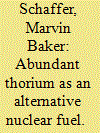

|
|
|
|
|
| Publication |
2013.
|
| Summary/Abstract |
It has long been known that thorium-232 is a fertile radioactive material that can produce energy in nuclear reactors for conversion to electricity. Thorium-232 is well suited to a variety of reactor types including molten fluoride salt designs, heavy water CANDU configurations, and helium-cooled TRISO-fueled systems.
Among contentious commercial nuclear power issues are the questions of what to do with long-lived radioactive waste and how to minimize weapon proliferation dangers. The substitution of thorium for uranium as fuel in nuclear reactors has significant potential for minimizing both problems.
Thorium is three times more abundant in nature than uranium. Whereas uranium has to be imported, there is enough thorium in the United States alone to provide adequate grid power for many centuries. A well-designed thorium reactor could produce electricity less expensively than a next-generation coal-fired plant or a current-generation uranium-fueled nuclear reactor. Importantly, thorium reactors produce substantially less long-lived radioactive waste than uranium reactors.
Thorium-fueled reactors with molten salt configurations and very high temperature thorium-based TRISO-fueled reactors are both recommended for priority Generation IV funding in the 2030 time frame.
|
|
|
|
|
|
|
|
|
|
|
|
|
|
|
|
| 3 |
ID:
096499
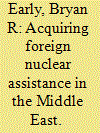

|
|
|
|
|
| Publication |
2010.
|
| Summary/Abstract |
The United Arab Emirates (UAE) has laid out an ambitious plan to become the first Arab country to possess a civilian nuclear energy program. Central to that effort has been the Emirati government's ability to obtain foreign nuclear assistance. This article traces the UAE's strategies for overcoming the obstacles that stood in the way of nuclear suppliers providing assistance. It examines the approach taken by the UAE to assuage the safety and security concerns of nuclear suppliers, how the UAE leveraged its alliances with France and the United States to obtain their cooperation, and its strategies for engaging domestic interest groups in supplier states. The generalizable elements of the UAE's strategies are discussed and used to provide insight into the prospects for other Middle Eastern states' bids to obtain similar assistance. The article concludes with a discussion of the potentially transformative aspects of the strategies employed by the UAE in shaping other countries' pursuit of nuclear energy in the region.
|
|
|
|
|
|
|
|
|
|
|
|
|
|
|
|
| 4 |
ID:
087151
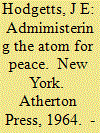

|
|
|
|
|
| Publication |
New York, Atherton press, 1964.
|
| Description |
xi, 189p.
|
|
|
|
|
|
|
|
|
|
|
|
Copies: C:1/I:0,R:0,Q:0
Circulation
| Accession# | Call# | Current Location | Status | Policy | Location |
| 000646 | 333.7929/HOD 000646 | Main | On Shelf | General | |
|
|
|
|
| 5 |
ID:
166655
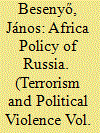

|
|
|
|
|
| Summary/Abstract |
We have heard ever more about the growing Russian presence in Africa in the past few years, which might appear strange for many people. Those, however, who know the history of the Black Continent, also know that Russian presence is not a new phenomenon. Africa was an important place during the Cold War where the Soviet Union not only competed with the United States of America, but also with China. For those who observed the robustly growing US and Chinese Africa policies, it could have appeared after the end of the classic Cold War, that the Russians had retreated beyond the borders of their country, abandoning the Black Continent in favour of their previous rivals. However, it did not happen, because the Russians did not close their diplomatic missions as they did in the former socialist countries of Eastern Europe. Furthermore, the Russians played a key role in UN Peacekeeping Missions in Africa, where they provided the necessary Air Transportation Capabilities together with the Ukrainians. Today it is becoming obvious that not only a new form of the Cold War has been resumed between the West and Russia but also the fact that the Russian “retreat” was only temporary. The relations with African countries are becoming increasingly important not only for the Russians, but also for the Africans, who need no longer choose between the American and the Chinese way of development. Even though the US and China did not view Russia as a competitor in the recent past, taking into account the events of the past few years the situation has changed. We also need to see that Russia—similarly to China—is primarily a competitor to US great power interests. China intends to cooperate with Russia, rather than competing, whilst not denying the existence of competition between the two countries. I would like to give a picture of this process in my study, including the changing balance of powers in Africa.
|
|
|
|
|
|
|
|
|
|
|
|
|
|
|
|
| 6 |
ID:
108805
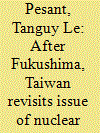

|
|
|
| 7 |
ID:
061425
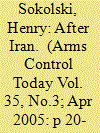

|
|
|
| 8 |
ID:
089752
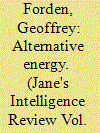

|
|
|
|
|
| Publication |
2009.
|
| Summary/Abstract |
President Mahmoud Ahmadinejad's retention of power means that Iran's nuclear ambitions are likely to continue. This article explores how and when Iran could achieve a nuclear weapons capability and what these scenarios might entail.
|
|
|
|
|
|
|
|
|
|
|
|
|
|
|
|
| 9 |
ID:
094537
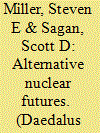

|
|
|
| 10 |
ID:
161315
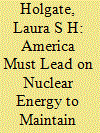

|
|
|
|
|
| Summary/Abstract |
To many, the March 2011 Fukushima disaster seemed to sound the death knell for nuclear energy. In the seven years since the accident, Japan has restarted only a handful of its more than 50 nuclear reactors, and Germany too began shuttering its nuclear power plants. Even the United States, the world’s largest nuclear power producer, has only built one new reactor since 1996.1
1 “How Old Are U.S. Nuclear Power Plants, and When Was the Newest One Built?,” Energy Information Administration, last modified June 21, 2017, https://www.eia.gov/tools/faqs/faq.php?id=228&t=21.
View all notes
However, this impression deceives—nuclear power’s apparent demise has proven to be more of a localized phenomenon. While it is in steady decline in parts of Europe, the United States, and Japan, nuclear energy is poised for growth in the world’s emerging economies. From the Persian Gulf to the Asia-Pacific, economic, environmental, and technological factors are converging to make commercial nuclear power a sensible electricity source for countries looking to decarbonize their economies without sacrificing growth.
|
|
|
|
|
|
|
|
|
|
|
|
|
|
|
|
| 11 |
ID:
101400


|
|
|
|
|
| Publication |
2011.
|
| Summary/Abstract |
Nuclear energy comes back to the discussions on the world stage as an energy source that does not contribute to global warming during production process. It can be chosen as the main source of power generation in some countries or complement the energy matrix in others. In this context, there is the need to develop new technologies for the management of radioactive waste generated by the production process. Final repositories for spent fuel are not yet in commercial operation, and techniques for fuel reprocessing have been developed, because after use, the fuel still has materials that produce energy. Some countries already use reprocessing, and develop research to make it more secure and more competitive, while others prefer to adopt policies to prevent developments in this area due to the problem of nuclear proliferation. In another line of research, new reactors are being developed in order to reduce the amount of waste in energy production and some will be designed to work in closed loop, recycling the materials generated.
|
|
|
|
|
|
|
|
|
|
|
|
|
|
|
|
| 12 |
ID:
118774
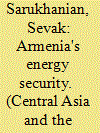

|
|
|
| 13 |
ID:
151874
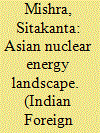

|
|
|
| 14 |
ID:
171536
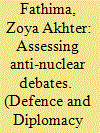

|
|
|
| 15 |
ID:
176631
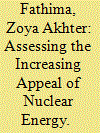

|
|
|
| 16 |
ID:
118773
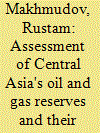

|
|
|
| 17 |
ID:
098688
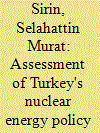

|
|
|
|
|
| Publication |
2010.
|
| Summary/Abstract |
Nuclear energy, which was once considered as the fuel of future and was abandoned after Chernobyl accident, has emerged recently in developed and developing countries as an option to combat climate change, to secure supply and to achieve sustainable development. Turkey, a developing country where most of the electricity is produced from fossil fuels and which has energy security problems, has adopted a new legislation giving financial incentives for nuclear power plant construction, along with a tender in 2008. However, the tender ended in a stalemate after the Council of State's decision in November 2009. An evaluation of Turkey's nuclear policy in light of South Korea's nuclear experience gives us an explanation as to why Turkey failed in the last tender. Basically it was due to lack of a long term nuclear energy policy that comprehends social, economical, technical and political aspects of nuclear energy. Thus, it is argued that Turkey can benefit from nuclear energy if it formulates a comprehensive nuclear energy plan clearly interwoven with its economic development plans, establishes a proper legal framework and has domestic industry participation in nuclear technology development.
|
|
|
|
|
|
|
|
|
|
|
|
|
|
|
|
| 18 |
ID:
041402
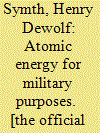

|
|
|
|
|
| Publication |
California, Stanford University Press, 1989.
|
| Description |
xv, 324p.
|
| Series |
Stanford Nuclear Age series
|
| Standard Number |
0804717222
|
|
|
|
|
|
|
|
|
|
|
|
Copies: C:2/I:0,R:0,Q:0
Circulation
| Accession# | Call# | Current Location | Status | Policy | Location |
| 021889 | 358.39/SMY 021889 | Main | On Shelf | General | |
| 032621 | 358.39/SMY 032621 | Main | On Shelf | General | |
|
|
|
|
| 19 |
ID:
032949
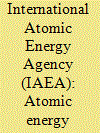

|
|
|
|
|
| Publication |
Vienna, International Atomic Energy Agency, 1975.
|
| Description |
241pPaperback
|
|
|
|
|
|
|
|
|
|
|
|
Copies: C:1/I:0,R:0,Q:0
Circulation
| Accession# | Call# | Current Location | Status | Policy | Location |
| 016672 | 546.4225/INT 016672 | Main | On Shelf | General | |
|
|
|
|
| 20 |
ID:
038314
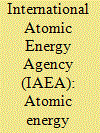

|
|
|
|
|
| Publication |
Vienna, International Atomic Energy Agency, 1966.
|
| Description |
112p
|
|
|
|
|
|
|
|
|
|
|
|
Copies: C:1/I:0,R:0,Q:0
Circulation
| Accession# | Call# | Current Location | Status | Policy | Location |
| 016671 | 546.434/INT 016671 | Main | On Shelf | General | |
|
|
|
|
|
|
|
|
|